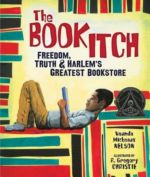
The Book Itch: Freedom, Truth & Harlem’s Greatest Bookstore
Written by Vaunda Micheaux Nelson
Illustrated by R. Gregory Christie
Carolrhoda, 2015
ISBN: 9780761339434
Knowledge is power. You need it every hour. Read a book.
This picture book biography of Lewis Michaux, founder of the National Memorial African Bookstore in Harlem, directly addresses the theme of literature as a key to unlocking potentials and opening possibilities. The author tells the story of her great uncle using the same source material as her earlier book, No Crystal Stair (2012), which received a Coretta Scott King Author Honor award and a Boston Globe-Horn Book award. While No Crystal Stair has more than 30 narrators and was written for a teen audience, this picture book uses one narrator, his young son Lewis, to tell the story of a man who believed that books can change lives.
Lewis Michaux’s dream was to establish a bookstore in Harlem that only sold books written by African Americans. The bookstore became a gathering place where many African Americans came to read, talk and purchase books, including Malcolm X, Mohammed Ali, Langston Hughes, and James Baldwin. The bookstore was founded in the 1930s but this picture book focuses on the tumultuous 1960s and Michaux’s close relationship with Malcom X. Lewis Jr. invites readers into his interactions with his father, famous visitors, and the patrons who made the store a success over a 40 year period. Lewis’ pride is evident as he talks about his father’s perseverance, financing the store from his own money and sleeping at the store when customers stayed late, and his determination to educate the community about African American history and the racial and political issues of that time. The vibrancy of the bookstore is conveyed along with an emotional climax around the assassination of Malcom X. The book integrates Michaux’s catchy slogans, such as “Don’t get took! Read a Book!” and “Nobody can give you freedom. Nobody can give you equality or justice or anything. If you’re a man, you take it” into the text and endpapers. His words convey both his belief in books and his commitment to black pride.
The richly textured expressionistic paintings by Christie contain bold strokes of color to depict scenes of strong emotion at the bookstore, on the streets and in the family home and to convey the role of the bookstore in the midst of the racial tensions in the 1960s. The browns and grays on the faces are contrasted against orange and yellow backgrounds to capture the strong emotions of both the famous and the ordinary people who came in contact with the bookstore. The book has back matter that includes a list of sources, author’s note, and biographical notes.
The author, Vaunda Micheaux Nelson, knew little about her great uncle but was intrigued with his life story and spent years shifting through library collections, examining family archives, listening to audio recordings, and interviewing people who knew him. Her primary source was Lewis Michaux Jr. who had many memories of working alongside his father in the shop, and so she selected his voice as the narrator for this picture book follow-up to No Crystal Stair (2011). A librarian who lives in New Mexico, she is the author of historical picture books that feature the lives of African Americans, including Bad News for Outlaws: The Remarkable Life of Bass Reeves, Deputy U.S. Marshall (2009) and Almost to Freedom (2003). R. Gregory Christie has won several Coretta Scott King Honor awards for his illustrations and was named to the New York Times’ annual Best Illustrated Children’s Book list. He is a freelance illustrator who has done artwork for over 50 children’s books, including Nelsons’ Bad News for Outlaws, along with album covers, newspapers, and magazines. He lives in Decatur, Georgia where he operates a children’s bookstore.
This book provides many possibilities for pairings. One possibility is books about famous African Americans who visited the bookstore, such as Malcolm X: A Fire Burning Brightly by Walter Dean Myers (2003), Malcom Little: The Boy Who Grew Up to Be Malcolm X by Ilyasah Shabazz and A.G. Ford (2014), Langston Hughes by Alice Walker (2001), and The Greatest: Muhammed Ali by Walter Dean Myers (2001). Another pairing is picture books that raise issues of race, such as The Other Side by Jacqueline Woodson (2001), Freedom Summer by Deborah Wiles (2000), Freedom on the Menu by Carole Boston Weathford (2007), and Rosa by Nikki Giovanni (2007). The book could also be paired with books about Harlem, such as Harlem by Walter Dean Myers (1997), Harlem Renaissance Party by Faith Ringgold (2015), The Block by Langston Hughes and Romare Bearden (1995), and Jakes Makes a World: Jacob Lawrence, an Artist in Harlem by Sharifa Rhodes-Pitts (2015).
The idea of an author finding one book embedded in another could be explored by pairing The Book Itch and No Crystal Stair with The One and Only Ivan (2012) and Ivan: The Remarkable Story of the Shopping Mall Gorilla (2014) by Katherine Applegate, Cod: A Biography of the Fish that Changed the World (1998) and The Cod’s Tale (2014) by Mark Kurlansky, or Hitler Youth (2005) and The Boy Who Dared (2008) by Susan Campbell Bartoletti.
Finally, the powerful message about books as a key to possibility could be further explored by pairing this book with More Than Anything Else by Marie Bradby and Floyd Cooper (1995), Richard Wright and the Library Card by William Miller and R. Gregory Christie (1997), and Tomás and the Library Lady by Pat Mora and Raúl Colón (2000).
Kathy G. Short, University of Arizona, Tucson, AZ
WOW Review, Volume VIII, Issue 4 by Worlds of Words is licensed under a Creative Commons Attribution-NonCommercial-ShareAlike 4.0 International License. Based on work at https://wowlit.org/on-line-publications/review/viii-4/
